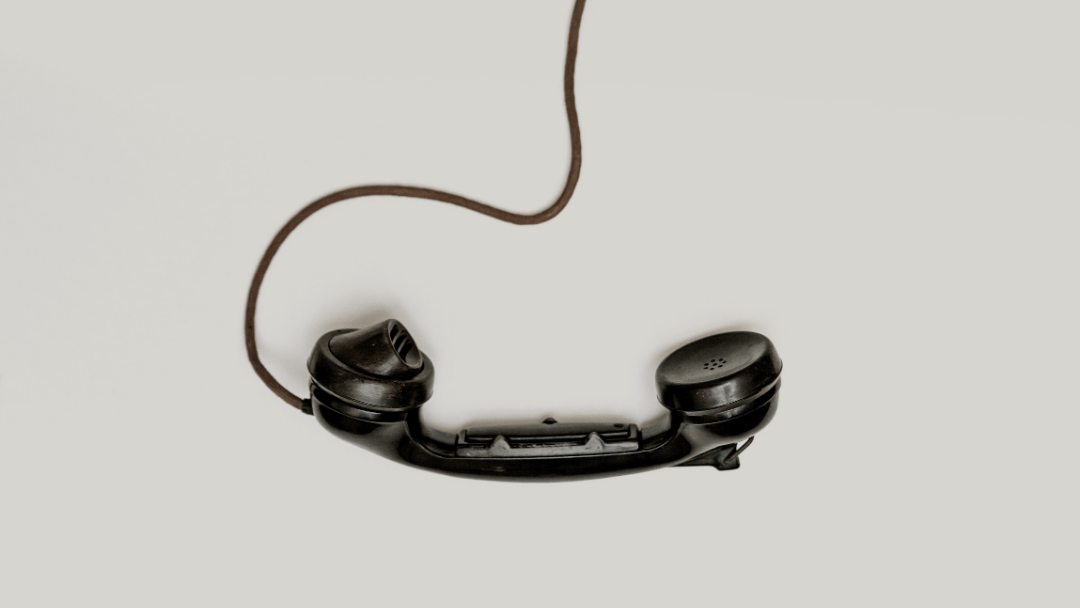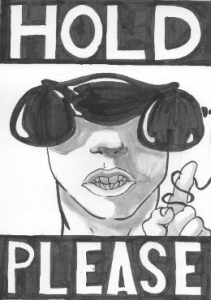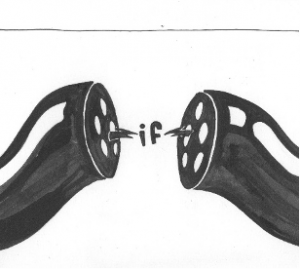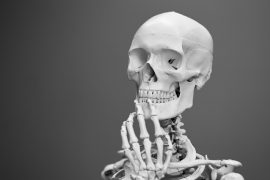art by Georgia Gump
The first time I saw the telephone I was driving home from work. The same route every day, then all of a sudden, something different. I’m idling, listening to KHAK, window rolled down, and there it was on the retaining wall across the street. At 7thand 31st. Right by the American Legion.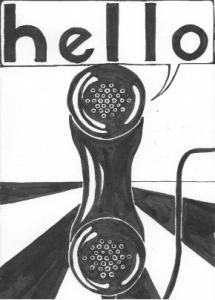
It’s not an exaggeration to say I’ve never seen a stencil tag in Marion. There’s loopy teenage scroll under the bridge by Thomas Park. One of those peeing Calvin cartoons on the wall behind the Blue Room bar. Small, unobtrusive things.
But a print like this was the sort of thing I’d see in Prague when we went on family trips. Beautiful, edgy stuff with meanings I couldn’t master thanks to my rudimentary Czech.
It was big, at least four feet tall. The swagger of it made me proud. Iowans aren’t known for swagger.
I said something to Regina, my neighbor, when I got home. She was bent over the rain barrel with a watering can, still in her nice call center clothes.
“These tomatoes are so dry!” she said. “I just had to get after them right away.”
“You see that graffiti over by the Legion?” I said.
“No,” she said, hefting the can up. “God, I remember landlines. Remember those clear phones where you could see all the guts inside? I had one of those in my room in high school. Wonder whatever happened to that.”
I couldn’t stop thinking about that tag. But I wouldn’t say anything to my coworkers at zinc, a web design company in one of those shiny new factory overhauls downtown. Our building was stuffed with pool tables and communal work spaces and bars and fridges stocked full of free goodies. Just like a company store, but you paid with your time.
I wear jeans to work every day, but I iron my t-shirts. Wear a suit jacket. Old habits.
Mom worked at the Blue Room for years, standing behind the bar. She shined her shoes every night. “It’s not for them,” she’d say.
At zinc, I spend most of my days trying to take up as much space as possible so people don’t sit next to me. Every morning I get there early and unload all over a table: a coffee mug, a glass of water, two pencils, three pens, a sketchpad, some drawings, some receipts, some spreadsheets. Somedays, if I’m really feeling the space, I get out my charcoals and make the table all dusty.
Most of the guys at work call me Eddie. I like it, and I know what it means: that I’m on the same level as them. Calling me something masculine means I’m more like them than not. It’s supposed to be a compliment.
If a guy’s new, or pissed at me, he’ll call me by my full name: Edita. To take me down a peg, remind me that I don’t really belong.
Your own name gets used against you.
“Kill ‘em with kindness,” my mother used to say when I was a kid. My mother was a very small woman, just over five feet. She died before smartphones, before the internet was really a thing.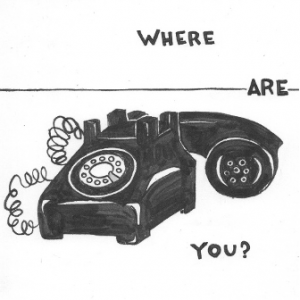
The day after I saw the telephone I called in and took the day to drive around Marion and Cedar Rapids, and who knows where else – Hiawatha? Fairfax? – looking for more tags. I’d make a day of it, I decided, and got coffee and a roll from the Kettle House.
I hadn’t taken a day off in months.
We—well, I—still have a landline at home, a cradle phone in an honest-to-god telephone nook that came with the place. Most people think it’s just for show, but it works.
Growing up my family had a wall mount in the kitchen, the heavy sort that acted more like an appliance than something personal. There wasn’t much privacy as kids, but if it’s all you know you don’t notice it. There was just the one phone, right in the center of everything. And when Grandma would call from Texas and Dad would stand there vacant, silent, you just read in your bunk. Curled up behind the rocking chair with headphones and listened to Mom’s weird European albums. Or traced your feet, over and over again, in chalk on the cellar floor. It was a small house, but there were always small places to burrow in and make your own.
I drive now, and new homes are bloated like ticks, the construction hurried and shoddy. My ex knows all these guys, the contractors, the electricians, the guys behind the pro desk at Home Depot.
“I’m glad we have an old house,” she always said. “This ain’t going nowhere.”
Sue works as a painter. She runs a small crew of guys and has two trucks, a pile of brushes, rollers, extenders and ladders, and a number of yard signs. When they’re on a job, she puts the sign in the client’s yard, a small white square that says “The Paint Crew” with a phone number. It’s a stencil, sprayed in black.
They don’t have a website. The phone number is our house phone.
Sue started the crew before we met, and it’s been going for seven years now. Just longer than we did. She makes surprisingly good money for six months of work, just picking up whatever jobs she wants. About $40,000 when all’s said and down.
When we met Sue was renting a little apartment and the garage behind, where she stored all the equipment.
I asked what she did all winter. “Cross-country ski,” she said. “Make a lot of chili. And there’s Christmas.”
Even when Sue was single she was big on Christmas. Beginning just before Thanksgiving she’d start a plan of volunteer efforts, decorating blitzes, and community work. She loved having the freedom, the flexibility.
“I could make more money,” she said. “But who cares?”
***
I wouldn’t always tell Sue when I took time off. I had the time, and it was my business. That was just our way. She was all over the area for work, so I didn’t know where she was half the time either. Some nights she’d be home before me, cooking some sort of stew with beer in it, or I wouldn’t see her until after eight, when she came in splattered in paint. We were in and out.
It was summer. I was thirty-two. Sue was thirty-six.
We had plans. This was how we worked it: I paid for the house in cash, a little two bedroom near the old train line. Sue paid the bills: the electric, the gas, the water. We only spent what she brought in. My salary went towards home repairs, flowers (because yeah), Christmas decorations (of course), and savings. Every winter we took a big trip, somewhere we could ski and do intense sled runs. Germany was a favorite spot, Finland. Last summer we ditched down to Argentina for two weeks and had one of the best times of our lives.
Moving this way, I thought, we could retire by forty-five. And still have plenty of fun.
Besides, Sue’s great for travel. She’s laid back, up for anything, and every man wants to be her friend. We’d always meet people, always find our way into someone’s home.
“Let’s not ski today,” she’d say at least once on every trip. “Let’s just see who’s around.” In Les Saisies Sue ended up spending two days at some guy’s house helping him paint a ceiling. Sue barely spoke French, but there the two of them were, up on their backs on a scaffold, cracking each other up.
The man (Claude? Clément?) had a mother not far down the road, so I went to see her, helped with her shopping, walked around the town with her holding my hand.
I called those Quantum Leap moments—times where if my younger self were to suddenly jump into my body, she’d be so pleasantly dumbfounded. Especially to see Sue, leaning out a second story window, spotted in paint, blowing me a kiss.
***
I didn’t see it coming, is what I would have told someone. If I told someone, which I didn’t. I didn’t tell anyone.
Sue had been seeing Tasha, my oldest friend, my friend I’d known since grade school, when we ran around on bikes together, getting freezes, swimming in the creek, laying on our backs at Thomas Park for hours, just watching the clouds, telling stories, smacking bugs.
Tasha, of all people.
“I don’t know how to explain it,” Sue said one night two weeks ago. Two weeks and one day ago. She just out and told me. “It’s the craziest thing.”
“But Tasha isn’t into women,” I said dumbly.
She wasn’t leaving me for Tasha, she wanted to make that clear. She was just leaving.
Was that worse? It felt worse.
I worked overtime, stayed late and played pool, took on extra projects. I stuffed my days full.
Because it was all the things you notice: Her ratty old work boots were gone, the ones I’d slip my bare feet into when I needed to quick run down to the cellar. Her coffee mug, the stack of beer cozies. I didn’t have to clean the mud room every night, run the vacuum every night. I’d come home from work and my loose change would be exactly where I’d left it. Some nights I’d walk right up and throw the coins across the room.
I said she could have the house. It was paid for, I could buy something else.
“I think I’ll get a camper, a little guy for the truck. I think I’m just going to travel around for awhile. Maybe go to Maine.”
“Is Tasha going?”
She laughed and shook her head, like we were still together, or like we were friends. Like we knew each other at all. “Could you see Tasha in something like that?”
Where was I going again?
I’d met Sue at a bar when I was back in Iowa taking care of my mother, and before all that, before we met, before I stayed and we got moving, I’d been bouncing around, a different city every year or two. Make a pile of money, blow it on an expensive apartment and eating out all the time, then move on and more of the same. Seattle, Boston, Miami for a short minute.
There was nothing fashionable about Iowa. Nothing sexy. But sitting in that bar with Sue I was starting to see the appeal of sincerity. Trees. Of people really not giving a fuck.
Sue recognized me. Not because we knew each other, but because we grew up the same: our rooms, our plates, all that had been the same size; we detassled in the summer; had the big, looming sky hold us accountable. She got it, all of it.
My mother used to call me every Sunday. Every Sunday I’d hear her voice and know she was talking only to me.
“What about your phone number?” I said when Sue and I were dividing things up. The landline was her business number. “How will you get jobs?”
“Same way I do now,” she shrugged. “Just paint over the signs and spray a new tag.”
“We can transfer the number.”
“That seems like a lot of work,” she said.
***
So far I’d managed to fill three hours driving the back bowels of Cedar Rapids: the alleyways behind Zin’s; Ellis Park with its massive flood wall; the shuttered A&W stand; the back hill of Oak Shade Cemetery; the Sinclair plant with its enormous clouds of steam. I was looking for large, clear walls. Away from cameras, but not far from foot traffic. Places where you could hide, but your work could be seen.
The only other time I’d done something like this was in my teens when I had friend, an older friend, who’d ride freight trains around Iowa. We met playing hacky sack outside Tobacco and News, that old shop up on the Hill. He’d come in to stock up for his next trip, and when he sat down to roll on the stoop I flubbed my turn and managed to wallop him in the head.
“Is it like that?” he said.
Chuck was a little sideways. The sort of guy you’d never really take around in public because he’d steal drinks, backpacks – always lifting something, then disappearing for days, weeks at a time. We never knew how old he was. Twenty-five? Forty?
He was just there, and then he was gone. But once, just once, he tried to make a plan. Said he’d be riding through on Saturday night and could I pick him up at the yard? There was a party on the south side, and if he walked all the way there he’d be sweaty. There was someone he wanted to impress.
I knew he’d be sweaty and smelling like oil from riding in a boxcar all day, so there wasn’t a worry about being fresh. I wondered if the girl he wanted to impress was me.
I brought Tasha, dear Tasha, and we drove as near the railyard as we could get, down rutted roads, through unlit underpasses. We were in the middle of town, but it was dark like country, industrial country: a spooky haze over everything.
We were young and in a car. If you wanted to talk to someone, you just did. Every person we saw passed out by a tree, in a bush, we whispered: Hey Chuck! Oh, have you seen Chuck?
We finally gave up and went to the movies, Truman Show, maybe. We didn’t know where the party was, and didn’t care. It was hot, and driving around like that just made me want to go inside and wash my hands.
Three days later, there’s Chuck outside Tobacco and News, talking like we’d just seen him that morning.
“Oh,” he said. “Train didn’t stop that run and I ended up all the way in Dubuque. There’s no telling.”
I saw him once or twice more after that. Then never again.
***
I took pictures of the tags I found and posted them on Instagram, then checked and rechecked my phone to see who liked it, who commented.
Maybe I’d get a tip on another tag, I thought, checking again. But really that wasn’t it at all.
Sue didn’t have a cell phone.
I sat alone in my car and stared at my phone, willing it, making bargains with it. Waiting for a direct connection.
***
I parked at the West End tap on the SW side, forty minutes from home this time of day. I’d never been here, but I’d driven past for years. How does that happen? You get attached to somewhere you’ve never even been.
It was a windowless hallway of a bar, with stools on one side and very small tables on the other, plus a pool table and a jukebox. You could fit maybe thirty people in the whole place.
I didn’t notice at first. Just ordered my vodka lemonade and took out my phone. It wasn’t that my phone didn’t work; it wouldn’t even turn on. I tried again and again, then looked up.
There were four people at the bar, and none of them had their phones out. One woman looked at me and smiled.
“They don’t work in here, honey. Dan put some sort of blocker in the ceiling makes ‘em do that.”
“Is that legal?” I said.
“Sign’s on the door,” she pointed. Sure enough, there was a sign right when you walked in. Phones are disabled upon entering. Not responsible for damages. And then, in larger letters: Fully responsible for your good time!
“It’s her first time here,” the woman said to the bartender.
“Welcome,” he said, laying down a napkin, a quarter, and what looked like pudding in a to-go dipping container. “Newbies get a complimentary pudding shot and a song on the jukebox.”
“They’re good today,” a man at the end of the bar said. “Last week they were mint.” He stuck his tongue out.
“You still took it,” the barman said. The man nodded.
I never got anyone’s name. It was the sort of group who all knew each other, and maybe none of them knew each other’s names either. It was the sort of place where things like that didn’t matter.
I drank vodka lemonades. Played Dwight Yoakum tunes on the jukebox. At some point the bartender brought out a crockpot of little smokies and that was dinner.
I told everyone about what I’d been doing, about the graffiti, but they were more interested in the route I’d taken, making me talk it through, turn by turn. Everyone knew a different layer of town history, so I’d say Nelson’s Meat Market or Olive and 7th and listen to them peel it back like an onion.
“What are those things?” the woman finally asked. “Those things you were chasing?”
“I’ve got pictures,” I said, grabbing my phone out of habit.
“Just draw one out,” a man said. “I got a pen.”
I tried putting one on a bar napkin. I did the font, the stylings. I tried to get it just right.
The bartender set the bar phone in front of me for a model: a stumpy, ancient thing with a rotary dial and handset so heavy, so right, it could have been a weapon.
“Give it here,” the woman at the end of the bar said. She stretched out her hand like someone had just called, like she wanted a turn.
How did I get here? I thought, leaning way over to her, the cord pulled tight. Whose number did I even know by heart?
“Just listen to that,” she said, humming in tune with the dial tone. “Doesn’t that sound make you homesick for something?”
Like what you’re reading?
Get new stories or poetry sent to your inbox. Drop your email below to start >>>
OR grab a print issue
Stories, poems and essays in a beautifully designed magazine you can hold in your hands.
GO TO ISSUESNEW book release
China Blue by Catherine Gammon. Order the book of which William Lychack Jeffries calls “a fiery declaration of all that is inexpressible about desire and loss and the need to find a home in a world in which even the most solid and real of things feel often less than completely solid or real.”
GET THE BOOK
